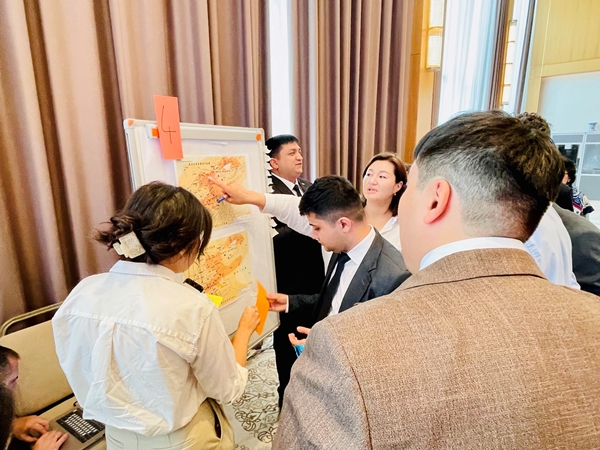
On 20 and 21 June 2023, over 60 participants representing a wide range of government and civil society organizations from Kazakhstan, Kyrgyzstan, Tajikistan, Turkmenistan and Uzbekistan as well as regional and international organizations convened in a workshop in Tashkent, Uzbekistan. The event was organized by the Office of the Co-ordinator of OSCE Economic and Environmental Activities (OCEEA) in partnership with adelphi, a Berlin-based think tank.
Building on the results of the Regional consultation on climate change and security in Central Asia, the workshop enabled discussions on climate-related challenges in high mountain areas and lowlands and explored opportunities for co-operation to address these challenges.
Across Central Asia, temperatures are expected to rise by 2.5-6.5 degrees Celsius by the end of the century. This makes the entire region increasingly vulnerable to the impacts of climate change, including droughts, desalination, high temperatures, heat waves, heavy precipitation, mudflows, floods, and avalanches.
“Climate change impacts do not exist in isolation from insecurity and instability. When states co-operate with each other in tackling climate change and preserving shared natural resources, this contributes to good neighbourly relations, prosperity, stability and security. This is the essence of the 2021 OSCE Ministerial Council Decision on climate change and the OSCE’s work in the field of climate change and security, including in the Central Asia region” said Igli Hasani, Co-ordinator of OSCE Economic and Environmental Activities.
During the workshop, participants discussed challenges like livelihood insecurity in mountain areas, the implications of glacial melting for natural resource management in highlands and lowlands, early warning to address hazards arising from glacial melting, and migration. After considering these shared challenges participants were able to explore potential areas of co-operation, helping them better address these issues at regional and transboundary levels while ensuring the active involvement of women and youth.
“Climate-related challenges are especially evident in Central Asia’s high mountain areas. There, climate change is accelerating glacial melting, thereby threatening the capacity of glaciers to store critical water resources for the entire region, while also posing a number of hazard risks. It is also likely to affect the livelihoods of many communities living in these mountain areas. Therefore, efforts to foster regional co-operation to address these risks are urgently needed”, highlighted Beatrice Mosello, Senior Advisor at adelphi.
The regional workshop “Towards enhanced co-operation for addressing climate-related security risks in Central Asia” was organized within the framework of the OSCE project Strengthening responses to security risks from climate change in South-Eastern Europe, Eastern Europe, the South Caucasus, and Central Asia, which is implemented in partnership with adelphi and in close collaboration with the OSCE Field Operations.
The project is funded by Andorra, Austria, Czech Republic, Finland, France, Germany, Italy, Japan, Liechtenstein, Luxembourg, Norway, Poland, Sweden, Switzerland and the United States. ///OSCE, 21 June 2023
#OSCE, #Central_Asia, #Climate_change, #Kazakhstan, #Kyrgyzstan, #Tajikistan, #Turkmenistan, #Uzbekistan, #Adelphi